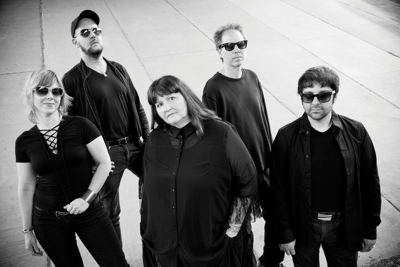
Vanessa Briscoe Hay was the voice of Pylon, one of post-punk’s greatest bands, and she still is from time to time. Pylon has always been a conceptual enterprise — like fellow Georgia musician James Brown, the quartet invented a streamlined style that relies on interaction and strives for abstraction. The influential music Pylon began to make in Athens, Ga., in 1979 draws upon Brown’s kinetic music and the innovations of punk and New Wave, and Hay’s playful singing helped define a series of ’80s recordings that are danceable, cryptic and psychologically complex.
Pylon weathered multiple breakups and reunions before the 2009 death of guitarist Randy Bewley put an end to the group. Their dance-funk concept, however, remains as fresh as it was in the beginning. Hay comes to town Friday fronting a new group of acolytes, Pylon Reenactment Society, who play the band’s repertoire as it was meant to be heard: wire-tight and simmering. Hay, who was born in Atlanta in 1955, joined a group of Athens musicians four years ago to perform Pylon songs at an event called Art Rocks Athens. The idea took hold, and the Pylon Reenactment Society has been touring lightly, a schedule befitting a band that released its first singles when U.K. post-punks Gang of Four and New York rap pioneers The Sugarhill Gang were making history.
That was, perhaps, a simpler time. Somewhat improbably, the quartet of inexperienced University of Georgia art-students-turned-musicians immediately established its reputation by opening Gang of Four’s 1979 run of East Coast shows. One night in particular, an August date at The Hot Club in Philadelphia, was notable for the extramusical tensions that fueled the British band’s performance.
“Their trucks, or whatever they were using for transport, got stuck in a tunnel coming out of New York,” Hay tells the Scene from her home in Athens. “Finally they just blew in. One of them had a big bottle of whiskey — I think it was Rebel Yell. They got up onstage, and that’s literally one of the top five shows I’ve ever seen in my life.”
After returning home from the tour, which included a show at the famed rock club Hurrah in New York, Pylon began to release a string of singles that included “Beep” and “Cool.” Like Gang of Four, Scritti Politti and the Swiss punk group LiLiPUT, Pylon set out to subvert the conventions of the rock rhythm section, song form and singing itself.
On Pylon’s three studio full-lengths — 1980’s Gyrate, 1983’s Chomp and 1990’s underrated Chain — guitarist Randy Bewley used an unconventional tuning (A-D-G-C-E-E, for the boffins in the audience) that facilitated some of the most inventive rhythm-guitar work in rock history. Often playing a Supro Dual-Tone guitar, Bewley created uncanny post-funk riffs — what he devised for the Chain track “Metal” is particularly astonishing.
“There was a lot more intuition built into the whole project than there was actual planning or knowledge of exactly how to do it,” says Hay. Their 1982 track “Beep” is a prime example of how relying on instinct worked for Pylon, as it seems to barrel down an imaginary racetrack dotted with chicanes and the cone-like structures that inspired Pylon’s name. As Hay tells me, the band didn’t name itself after William Faulkner’s 1935 novel Pylon, which she says they weren’t aware of then. They were thinking about traffic cones.
Pylon was a critics’ favorite in the early ’80s, garnering glowing reviews from the likes of New York Rocker and influential Village Voice writer Robert Christgau. As Hay says, critical success didn’t translate into money, and the band broke up for the first time in December 1983. Fortunately for posterity, Pylon’s Athens farewell show that month was recorded, and the performance finally saw release in 2016 as Pylon Live. The group re-formed in 1989, released Chain and disbanded once again in 1991. (Both of those tenures included Nashville shows: Pylon played the long-gone venue Cantrell’s on Dec. 11, 1982, and May 14, 1983, and played Exit/In on March 11, 1990.)
Hay says the first split was a joint decision by the band, but the second breakup was Bewley’s idea. “It’s like he had some sort of internal timeline,” she says. “He was gonna give it this effort to see what we could do with it at that point. I don’t think it was moving along fast enough for him, for one thing.” The band began performing live again in 2004, and they played their final show in December 2008 at New York venue The Knitting Factory.
Hay and the musicians in the Pylon Reenactment Society — guitarist Jason NeSmith, bassist Kay Stanton, keyboardist Damon Denton and drummer Joe Rowe — give muscle to Pylon’s compositions, and Hay’s singing remains as tart and original as ever. Pylon’s musical reputation has grown steadily since 1979, which Hay chalks up to, among other things, the universal appeal of music that compels movement.
“I think it still sounds fresh because of what it is, and I think it’s danceable,” she says. “Some of it is pretty funny — we really did have a great sense of humor, but we’re not a comedy band, either. I think it’s just being open to the world.”
Email music@nashvillescene.com





